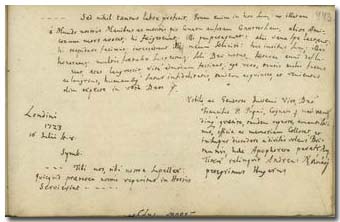
– – – Sed nihil tantus labor profuit. Tuum enim in hoc sum, ut
illatam à Mundo nostris Manibus ac meritis pio conatu auferam
controversiam, alios Amicorum mors avocat; hi frigescunt; illi
pauperascunt: alii vana spe lactant; hi trepidare faciunt;
intercedunt illi, mecum soliciti: his invitus sum; illis
honoratus; multis fortasse suspectens; soli Deo notus. Interea
anni defluunt, aetas languescit, vita admodum festinat; ego vero,
tantis malis fissus ac languens, humanaeque satur infidelitatis,
tandem acquiesco, et venientes olim expecto in votis Deos.
Nobili ac Generoso Juveni Viro, D[omi]no Francisco
P. Pápai,
Cognato & [?] diuque quaesito, tandem
reperto, amantissimo,
officia ac memoriam collocat
et insuper discedere a divitis volens
Britannis, haec

peregrinus Hungarus.
Londini 1723 16 Julii st[ilo] v[eteri].
Symb.
– - – Tibi nos, tibi nostra supellex:
quicquid praeterea nostris reperitur in Hortis
Servierint – - – - - |
|
“– – – However, all these efforts were worth of nothing. I am
yours, inasmuch I take up the dispute put into our hands and
entrusted to us by the world. Some of our friends have been
summoned by death; some have been reduced to poverty; others are
nourished by vain hopes; some I fear and some upset me; some steer
clear of me and some honour me; and only God knows me. In the
meantime the years pass on, and old age is nearing; and I,
troubled and weighed down by so many woes, and surfeited with the
unfaithfulness of people, finally acquiesce and look forward with
prayers to the arrival of the gods.”
To the eminent and noble young Ferenc Pápai Páriz, my long awaited
and finally discovered relative, I recommend my services and good
memory, and finally, leaving the riches of Britanny, I leave this
farewell present
András Nánásy, Hungarian
peregrinating student.
In London, on July 16, 1723, by the old
calendar.
Motto:
“– – – We are yours, yours is all we have / whatever you find in
our garden, is at your disposal – – – ”
|
p.
443. London, July 27, 1723
Nánási Lovász, András
(?-1750 után), Transylvanian
Reformed pastor
András
Nánási Lovász was born in Transylvania, the son of the Reformed
Archdeacon Mihály N. L. (1662-1709), grandson of the Archdeacon
István N. L. (1624-1683/84) and of the Reformed Bishop Mihály Tofeus (1624-1684).
He learned in Nagyenyed (Aiud), then in 1721 he went to the
university of Franeker. He also visited England. After returning
home, he was pastor in 1724 in Kassa (Košice), in 1728 Huszt
(Hust), Visk (Viskove) and Nyíracsád, from 1737 Marosszentkirály
(Sâncraiu de Mureş). After being banished from Hungary, he went to
exile in Transylvania, where in 1750 he became court pastor of the
Counts Teleki. His work, besides his funeral sermons and his poem
written on the death of Ferenc Pápai Páriz: Tacentis mundi respublica, sive cogitationes nonnullae
rationales de statu animarum post mortem; praeses Ruard
Andala, subjicit Andreas Nánási. Franeker, 1723.
Nánási wrote in the album of Pápai Páriz in July 1723. In this
same year he defended in Franeker under the chairmanship of
Ruardus ab Andala, who wrote in the album in 1719 (p.
129).
•
AlbFran 315 • Graaf • Peregrinus • Szinnyei • Zoványi-Ladányi |

